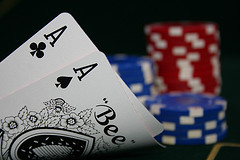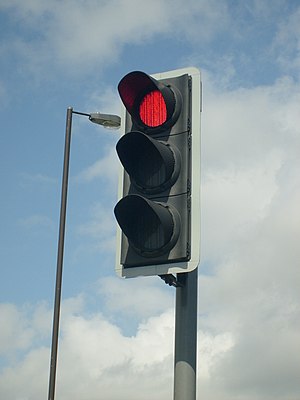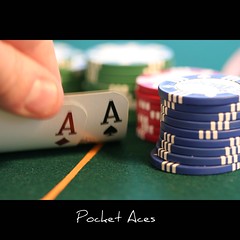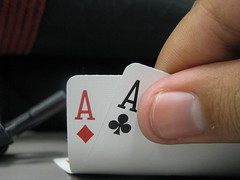Poker Quiz: You've got pocket Aces and your opponent has what?You are in a MTT tournament with $25,000 buy-in. You won the money playing at Fu
 Image via Wikipedia
Image via Wikipedia
ll Rush poker...lol. And you decided to come to Vegas play in this event at the Bellagio.
Poker QuizIt's in the early rounds. The blinds are $50-$100. You have about $23,000 in chips.
You are in seat 3. The player under the gun limps and you find pocket Aces. You want to get paid off with pocket Aces, and raise only $300. I would raise bigger myself, since everyone is deep stacked, but you play your way.
A player in late position calls as does the big blind and the limper. There are 4 players in the hand and the pot is $1,250. Pocket Aces against four players is not an ideal situation...but....
The flop is Ks-6d-5h. Excellent flop for Aces, I think.
There are two checks to you and you bet $800.
Everyone folds but the big blind calls. There is now $2,850 in the pot.
It is heads-up.
You should be thinking: What does your opponent have in this situation? What range of hands do you put him on?
My thinking: There are no flush draws. He may have top pair. He probably would have raised with two pair--but I don't see anyone calling a pre-flop raise with K-6 or K-5. 6-5 suited maybe, but no check raise so I don't see two pair. What about a set? A set is always possible, but I don't like assuming the worse.
Most likely hands to my thinking is probably K-10, K-Q, or K-J. I could be wrong.
The turn is a 9c. I like that card, unless my opponent has K-9 or 8-7.
He checks. You bet $1,800. A good bet. It controls the size of the pot. Oops. Your opponent check raises to $4,000.
Let's think this through...Let's start with the pot. It is $8,650. It will cost you only $2,200 to call.
What do you know about your opponent? Nothing, except he is in a $25,000 buy-in event, so he must know how to play the game.
Maybe he has K-10, K-Q, or K-J...or maybe he just hit two pair with K-9. You do have outs against two pair. You call.
The pot is now $10,850.
The river is an 8s. I don't see that changing anything. Either he had you on the turn or not.
Your opponent bets $7,500. Is that a value bet? A continuation bet? A pure bluff?
What should you do?
Poker AnswerThis was an actual hand at the WPT Championship.
The player with pocket Aces went into the tank. He finally called.
His opponent showed K-10 and lost the pot.
Some players think it was a bad call since there were so many ways that his opponent could have two pair. In general, it is tough to get any player to fold with pocket Aces.
Some Limit Cash GamesLast night, I decided to play some limit poker. It's been a long time.
I was watching this one hand and was quite surprised by this play. It was heads-up and the board was Kh-5h-9s-9c-2h. The player in position kept betting and being called. On the river, the player in position bet again, but this time he was check-raised.
He went into the tank, and folded, showing his 9. His opponent took down the pot and laughed as he showed pocket Aces. That is a bad play, because his opponent had shown a few bluffs already and it is only going to cost you one big bet.
Here are two hands that I were in last night. The learning for you is don't muck your hand, no matter what your opponent says he is holding.
#1. I had a set on the flop and was betting to protect my hand against two opponents. On the river one of these guys, check raises me. The board looked like he had a straight on the river. Still, I had to call. My opponent doesn't turn his cards over. Instead, he says, "I've got the straight." I kept waiting for him to show his hand. Finally, the dealer asks the player to show his cards. He has top pair, that's all. What a jerk.
#2. Here I am up against a different opponent. We are heads-up all the way to the river. I have A-2, and the board is A-A-4-J-4. On the river after I bet, my opponent raises me, I re-raise, he re-raises, and I call. He says "I've got a bigger full house." I'm thinking A-J and I get ready to muck. What does he show? A-4. Another jerk.
My warning to you, especially if you have been playing mostly online, is that when you go to the card room and someone tells you what they have on the river. Don't muck. Wait till you see the hand.
Reminder:Full Rush poker Freeroll
Wednesday October 28 at 9pm ET
It is a $50 Freeroll + you win another $10 Bounty if you knock me out. My name is: Myway1969
There is no password needed since only qualified players will see the event listed.
To sign up read this.
 Image via Wikipedia
Image via Wikipedia

![Reblog this post [with Zemanta]](http://img.zemanta.com/reblog_e.png?x-id=ac0d80de-034e-4495-ae84-c69baab7043c)

![Reblog this post [with Zemanta]](http://img.zemanta.com/reblog_e.png?x-id=afe3822c-d2ed-403b-8445-e638309876e1)


![Reblog this post [with Zemanta]](http://img.zemanta.com/reblog_e.png?x-id=93ce2e1a-9b51-4b28-91ab-6ecf0c54866f)







